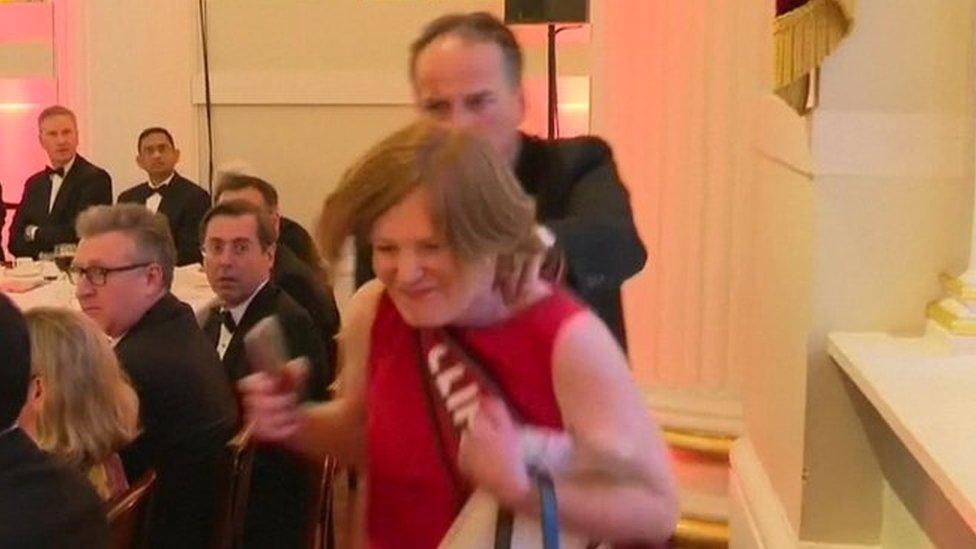Mark Field: What is the law on tackling intruders?
- Published
Mark Field has been suspended as a Foreign Office minister in the wake of the footage
Mark Field has been suspended as a Foreign Office minister after a video showed him grabbing a Greenpeace protester at a black tie dinner. But what does the law say on tackling intruders?
The "worst-case scenario" for someone tackling an intruder like this would be a common assault allegation, says Colin Rawson, a partner at Stephensons Solicitors.
"It's the lowest level of assault, where effectively there's little or no injury," he says.
Janet Barker, the protester who was confronted by Mr Field, says she does not intend to complain to police.
City of London Police said they were looking into "a number of third-party reports of a possible assault".
Legal experts say there are a number of defences which could justify a physical altercation with an intruder.
Police and the Crown Prosecution Service also have to determine whether a prosecution is in the public interest and whether there is a reasonable prospect of a conviction.
When can you use force to tackle an intruder?
Under the Criminal Justice and Immigration Act 2008, people can use "reasonable force" in self-defence, to defend someone else, to prevent a crime or to assist in the arrest of someone.
The law says you do not have to wait until someone is attacked: Fear of attack or fear that someone else could be attacked may be sufficient.
"There doesn't have to be an actual assault," says Mr Rawson.
Mr Field says he acted "instinctively" and was "genuinely" worried that the protester might be armed.
It does not matter that he proved to be incorrect about that threat, says Eric Baskind, a law lecturer at Liverpool John Moores University who has been an expert witness in self-defence cases.
"It is to be taken on the basis of the information that he's got, even if he has made a mistake in fact," he says.
What is reasonable force?
Mr Rawson said there may still be questions about the level of force applied.
"I would think it's the grabbing around the neck which is the most concerning part for the MP," he says.
How much force is reasonable comes down to the circumstances of each case.
But Mr Baskind says the law explicitly acknowledges that people may not be able to weigh up exactly the right level of force in the heat of the moment.
It says if a person only does what they think is "honestly and instinctively" necessary for self-defence, that is "strong evidence" for the force being reasonable.
Mr Baskind says he would have been surprised if charges had been brought against the MP.
"If this was you or me, it was clearly within the realms of what a person may do. No question."
What about security at the event?
Security guards have no more powers to use force than ordinary members of the public.
In practice, Mr Baskind says security professionals may be judged by a higher standard because of their training.
"The rights are the same, but whether the actions are reasonable will be determined by all of the circumstances, including a person's training," he says.
What about defending your own property?
Different laws were introduced in "householder cases" after the controversial prosecution of farmer Tony Martin, external for shooting dead a burglar at his Norfolk home.
Mr Baskind says courts may now decide that people in their own homes are allowed to use "disproportionate" force, as long as it is not "grossly disproportionate".
"You can imagine being in bed at night in a state of undress, you've probably got a wife or a husband or other relatives or children," he says.
"The court will recognise that what might be reasonable in those circumstances will be different."
But because the Greenpeace protesters were not entering a private home, that law would not have applied.
- Published21 June 2019
